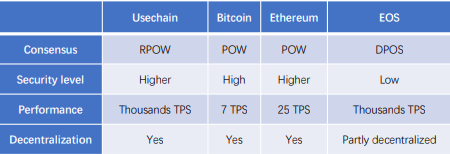The Randomized Proof of Work Consensus Algorithm by USECHAIN

Having done an extensive review on the Usechain blockchain and its use cases in my previous post, this particular post aims to shed more light and focus on the consensus algorithm being adopted by Usechain and how it is a better and more superior alternative to the current consensus algorithms. Usechain utilizes the Randomized Proof of Work (RPOW) consensus algorithm and this was easily achieved because Usechain has an identity mapping system.
Having carefully identified the defects and advantages of the current consensus algorithm, Usechain decided to introduce the Randomized Proof of Work (RPOW) consensus algorithm. This is because the Randomized Proof of Work (RPOW) is highly scalable, secure, efficient, and is able to offer full decentralization. This is one of the major defects of the current consensus algorithms because none of them can fully provide the above features being offered by the Randomized Proof of Work (RPOW).
CURRENT ALGORITHMS AND ITS DEFECTS
The typical blockchain networks such as ethereum, bitcoin, and EOS, all make use of different consensus algorithm. By consensus, I mean agreement or harmony. For example, several nodes (computers) can report the final score of a certain football match. The consensus here is the final agreement reached by the majority of the nodes on a single data value. However, there could be cases of nodes not truly reporting the actual data, and this could result in all nodes not being in consensus.
Currently, there are several consensus algorithms such as the Proof of Stake (PoS), Proof of Work (PoW), Delegated Proof of Stake(DPoS) etc, being used by the typical blockchain networks, and hardly will you find any of these current algorithms that are fully scalable, effective and secure. None of the current algorithms wholly exhibits the above features. For example, the Delegated Proof of Stake (DPoS) being used by EOS doesn't offer full decentralization because only a small number of persons take the full decision based on their stakes which in turn makes the consensus process more centralized. The Proof of Work which is being used by bitcoin meets the need of security and scalability but unfortunately not efficient because the energy consumption during mining is very high. On the other hand, the Proof of Stake is able to meet the demand of efficiency but lacks scalability and security.
USECHAIN'S RPOW AND HOW IT DIFFERS FROM OTHER CONSENSUS ALGORITHMS
Ideally, a consensus algorithm must be fault tolerant. Due to this, Usechain introduced the Randomized Proof of Work (RPOW) consensus algorithm to achieve this. The RPOW will be the driving force of the Usechain Blockchain. The RPOW uses a verifiable random function to determine an account specific random number and then the mining probability for each account is a function of a common random number and an account specific random number. This simply means that the persons on the consensus board are always generated through a random algorithm, in order to ensure that the same persons are not always on the board every time. This offers full decentralization of the system because, at every point in time, it's a randomly different set of people.
The combination of the mirror identity protocol and the Randomized Proof of Work (RPOW) consensus algorithm gives Usechain an edge. That is because it has greatly lessened the importance of computing powers in order to achieve the following:
A fair and transparent environment for mining for everyone. There is no special treatment for any machines such as ASIC.
Ability to withstand double-spending attack and lessen the possibility of a fork
In order to ensure that everyone is able to participate in the mining, users will be able to use DApps and also carry out mining of UST concurrently through their mobile devices. This
Provide an energy-friendly system so that more users can be supported without bothering about wasting energy because the utilization of the identity mapping enables the network to considerably lessen its reliance on hashing power and also the amount of energy consumed.
Provide a high-performance system which enhances the efficiency of transaction confirmation, as all the miners will be assigned with non-identical arduous tasks by each of the blocks, in order to balance the dispersal of the virtual harsh power.
Due to the fact that Usechain's mirror identity blockchain thrives on low energy consumption and also provides a fair environment for mining activities, the Randomized Proof of Work (RPOW) consensus algorithm is able to attain the verification of transaction on a high frequency.
In Conclusion, the Randomized Proof of Work (RPOW) consensus algorithm will provide a much better algorithm that is scalable, efficient, secure and enables full decentralization, thereby addressing the issues with the current consensus algorithms. From the above illustrations, it is quite evident that the Randomized Proof of Work (RPOW) being adopted by Usechain is much better than the current consensus algorithms in terms of scalability, performance, security, and efficiency.
Kindly visit https://www.usechain.net/ for more information.
Whitepaper: https://www.usechain.net/usechain_en.pdf
ANN: https://bitcointalk.org/index.php?topic=2498919
Twitter: https://twitter.com/usechain
Writer: Sucre123456
Bitcointalk profile link: https://bitcointalk.org/index.php?action=profile;u=1820055;sa=summary
